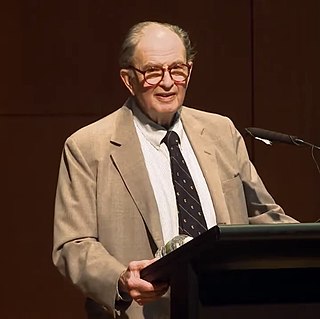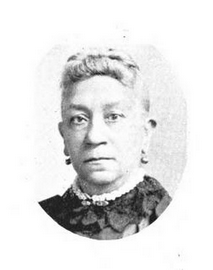Related Research Articles

Wallace Earle Stegner was an American novelist, writer, environmentalist, and historian. He was often called "The Dean of Western Writers". He won the Pulitzer Prize in 1972 and the U.S. National Book Award in 1977.

Bernard Bailyn was an American historian, author, and academic specializing in U.S. Colonial and Revolutionary-era History. He was a professor at Harvard University from 1953. Bailyn won the Pulitzer Prize for History twice. In 1998 the National Endowment for the Humanities selected him for the Jefferson Lecture. He was a recipient of the 2010 National Humanities Medal.

The African Methodist Episcopal Zion Church, or the AME Zion Church (AMEZ) is a historically African-American Christian denomination based in the United States. It was officially formed in 1821 in New York City, but operated for a number of years before then. The African Methodist Episcopal Zion Church adheres to Wesleyan-Arminian theology.

Gordon Stewart Wood is an American historian and professor at Brown University. He is a recipient of the 1993 Pulitzer Prize for History for The Radicalism of the American Revolution (1992). His book The Creation of the American Republic, 1776–1787 (1969) won the 1970 Bancroft Prize. In 2010, he was awarded the National Humanities Medal by President Barack Obama.
Steven Howard Hahn is Professor of History at New York University.

Sarah Jane Woodson Early, born Sarah Jane Woodson, was an American educator, black nationalist, temperance activist and author. A graduate of Oberlin College, where she majored in classics, she was hired at Wilberforce University in 1858 as the first black woman college instructor, and also the first black American to teach at a historically black college or university (HBCU).

Daniel Alexander Payne was an American bishop, educator, college administrator and author. A major shaper of the African Methodist Episcopal Church (AME), Payne stressed education and preparation of ministers and introduced more order in the church, becoming its sixth bishop and serving for more than four decades (1852–1893) as well as becoming one of the founders of Wilberforce University in Ohio in 1856. In 1863, the AME Church bought the college and chose Payne to lead it; he became the first African-American president of a college in the United States and served in that position until 1877.

Odd Arne Westad FBA is a Norwegian historian specializing in the Cold War and contemporary East Asian history. He is the Elihu Professor of History and Global Affairs at Yale University, where he teaches in the Yale History Department and in the Jackson School of Global Affairs. Previously, Westad held the S.T. Lee Chair of US-Asia Relations at Harvard University, teaching in the John F. Kennedy School of Government. Westad has also taught at the London School of Economics, where he served as director of LSE IDEAS. In the spring semester 2019 Westad was Boeing Company Chair in International Relations at Schwarzman College, Tsinghua University.

The back-to-Africa movement was a political movement in the 19th and 20th centuries advocating for a return of the descendants of African American slaves to the African continent. The movement originated from a widespread belief among some European Americans in the 18th and 19th century United States that African Americans would want to return to the continent of Africa. In general, the political movement was an overwhelming failure; very few former slaves wanted to move to Africa. The small number of freed slaves who did settle in Africa—some under duress—initially faced brutal conditions, due to diseases to which they no longer had biological resistance. As the failure became known in the United States in the 1820s, it spawned and energized the radical abolitionist movement. In the 20th century, the Jamaican political activist and black nationalist Marcus Garvey, members of the Rastafari movement, and other African Americans supported the concept, but few actually left the United States.
Thomas Cleveland Holt is an American historian, who is the James Westfall Thompson Professor of American and African American History at the University of Chicago. He has produced a number of works on the people and descendants of the African Diaspora. He served as president of the American Historical Association in 1994.

Clayborne Carson is an American academic who is a professor of history at Stanford University and director of the Martin Luther King, Jr., Research and Education Institute. Since 1985, he has directed the Martin Luther King Papers Project, a long-term project to edit and publish the papers of Martin Luther King Jr.

James T. Patterson is an American historian, who was the Ford Foundation Professor of History at Brown University for 30 years. He was educated at Harvard University. His research interests include political history, legal history, and social history, as well as the history of medicine, race relations, and education. In 1981–1982, he was the Harold Vyvyan Harmsworth Professor of American History at Oxford University.
Vincent Brown is Charles Warren Professor of History, Professor of African and African-American Studies, and Director of the History Design Studio at Harvard University. His research, writing, teaching, and other creative endeavors are focused on the political dimensions of cultural practice in the African Diaspora, with a particular emphasis on the early modern Atlantic world.
Tiya Alicia Miles is an American historian. She is Michael Garvey Professor of History at Harvard University and Radcliffe Alumnae Professor at the Radcliffe Institute for Advanced Study. She is a public historian, academic historian, and creative writer whose work explores the intersections of African American, Native American and women's histories. Her research includes African American and Native American interrelated and comparative histories ; Black, Native, and U.S. women's histories; and African American and Native American women's literature. She was a 2011 MacArthur Fellow.

St. James AME Zion Church is a historic African Methodist Episcopal Zion church located at Ithaca in Tompkins County, New York. It is a two-story, frame church structure set on a high foundation and featuring a four-story entrance tower. The church structure was begun in the 1830s and modified many times since. The original stone meetinghouse was built in 1836 and is believed to be Ithaca's oldest church and one of the oldest in the AME Zion system.
Lance Banning was an American historian who specialized in studying the politics of the United States' Founding Fathers. He taught mostly at the University of Kentucky.
Rebecca Jarvis Scott is an American historian, and Charles Gibson Distinguished University Professor of History and Professor of Law, at University of Michigan.
Barbara Weinstein is a professor of Latin American and Caribbean history at New York University. Her research interests include race, gender, labor, and political economy, especially in relation to the making of modern Brazil.
Nancy G. Isenberg is an American historian, and T. Harry Williams Professor of history at Louisiana State University.
This bibliography of slavery in the United States is a guide to books documenting the history of slavery in the U.S., from its colonial origins in the 17th century through the adoption of the 13th Amendment to the Constitution, which officially abolished the practice in 1865. In addition, links are provided to related bibliographies and articles elsewhere in Wikipedia.
References
- ↑ "Stanford History Department". Archived from the original on 2012-01-23. Retrieved 2009-11-10.
- ↑ "Africana Studies | Brown University".
- ↑ "Freedom Now! Contact".
- ↑ "J. Anthony Lukas Prize Project winners". Nieman Foundation for Journalism at Harvard. Retrieved 16 March 2011.
- ↑ Arsenault, Raymond (June 11, 2006). "A Sort of Homecoming". The New York Times .